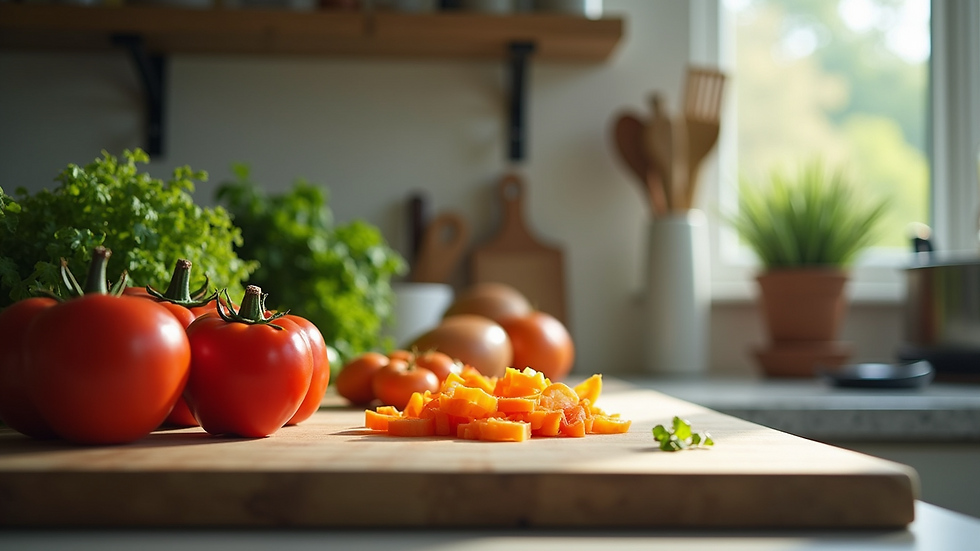Essential Cooking Tips Every Beginner Should Know
- Greg Randall
- Oct 7, 2025
- 4 min read
Alright, so you’ve decided to dive into the world of cooking. Maybe you’re tired of takeout, or you want to impress someone special, or you just want to stop burning toast every morning. Whatever your reason, welcome! Cooking can be fun, rewarding, and yes, sometimes a little messy. But don’t worry, I’ve got your back with some essential beginner cooking basics that’ll make your kitchen adventures way less intimidating.
Let’s get real: cooking doesn’t have to be complicated. You don’t need a fancy kitchen gadget or a culinary degree to whip up something tasty. You just need a few solid tips, a bit of patience, and maybe a good playlist to keep you company. Ready? Let’s jump in.
Beginner Cooking Basics: Setting Yourself Up for Success
First things first, let’s talk about the basics you need to get started. Think of this as your cooking foundation. Without it, things can get messy—literally and figuratively.
Get Your Tools Right
You don’t need every gadget under the sun. But a few essentials will make your life easier:
A good chef’s knife: Sharp and comfortable. Trust me, dull knives are dangerous.
Cutting board: Preferably one for veggies and one for meat.
Non-stick skillet: For easy cooking and cleaning.
Saucepan: For boiling, simmering, and sauces.
Measuring cups and spoons: Precision matters, especially when you’re starting out.
Stock Your Pantry Smartly
You don’t need a pantry that looks like a grocery store, but having some staples on hand is clutch:
Olive oil and vegetable oil
Salt and pepper
Garlic and onions
Canned tomatoes
Rice and pasta
Basic spices like paprika, cumin, and chili powder
Prep Like a Pro
Before you start cooking, read the recipe all the way through. Chop your veggies, measure your spices, and have everything ready. This is called “mise en place” (fancy French for “everything in its place”). It saves you from scrambling mid-cook and keeps things chill.

Why Following Beginner Cooking Basics Makes a Difference
When you stick to these beginner cooking basics, you’re setting yourself up for success. It’s like building a house—you need a solid foundation or it’ll all come crashing down.
Avoiding Common Mistakes
Ever tried to cook pasta and ended up with a sticky, gloopy mess? Or maybe you’ve burned garlic because you got distracted. These things happen, but with a few simple habits, you can avoid them:
Don’t overcrowd the pan: Food needs space to cook evenly.
Use the right heat: High heat for searing, low heat for simmering.
Taste as you go: Don’t wait until the end to find out your dish is bland.
Building Confidence
Cooking can feel overwhelming at first. But once you get the hang of these basics, you’ll start to feel like a kitchen ninja. You’ll know when to add salt, how to tell if chicken is cooked, and when your sauce needs a little extra love.
Save Time and Money
Cooking at home is cheaper than eating out, but only if you don’t waste ingredients or burn your food. Planning, prepping, and following simple steps help you avoid waste and save cash.
What are the 5 P's of Cooking?
You might have heard about the 5 P’s of cooking. They’re a handy way to remember the key elements that make cooking easier and more enjoyable. Here they are:
Preparation - This is your mise en place. Get everything ready before you start.
Patience - Good food takes time. Don’t rush the process.
Practice - The more you cook, the better you get. Don’t be afraid to mess up.
Presentation - We eat with our eyes first. A little garnish or neat plating goes a long way.
Passion - Love what you’re doing. It shows in the food.
Keep these in mind, and you’ll be cooking like a pro in no time.

Handy Hacks and Tips to Make Cooking Easier
Now, let’s get into some practical tips that I wish someone told me when I started cooking.
Use Fresh Ingredients When You Can
Fresh herbs, veggies, and meats make a huge difference. But if fresh isn’t an option, frozen is your friend. It’s often picked and frozen at peak freshness.
Don’t Be Afraid of Salt
Salt is your best friend in the kitchen. It brings out flavors and balances dishes. Just don’t go crazy. Add a little at a time and taste as you go.
Keep Your Knives Sharp
A sharp knife is safer and faster. If you don’t have a sharpener, get one or take your knives to a pro. It’s worth it.
Clean as You Go
This one saves you from a mountain of dishes later. Wash bowls, knives, and cutting boards while your food cooks. Your future self will thank you.
Use a Timer
Even if you think you can eyeball it, timers are lifesavers. Set one for every step that needs precise timing.
Experiment with Spices
Don’t be shy. Try new spices and combinations. Start small and build your confidence.
Learn to Make a Basic Sauce
A simple tomato sauce or a quick pan sauce can elevate any meal. Once you master these, you can customize endlessly.

Ready to Take the Next Step?
Cooking is a journey, not a race. Start simple, follow these beginner cooking basics, and don’t be afraid to make mistakes. Remember, every great chef started somewhere, usually with a burnt pan or two.
If you want more detailed advice, recipes, and honest reviews to help you navigate your kitchen adventures, check out Randall's Kitchen. It’s packed with practical cooking tips for beginners and seasoned food lovers alike.
So, grab your apron, turn on some tunes, and get cooking. You’ve got this!
Happy cooking, and may your kitchen always smell amazing!



Comments